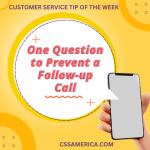 Studies show that 40% of customer dissatisfaction was because the company didn’t meet the customer’s expectations. The company overpromised and under delivered, or the company didn’t even do the bare minimum of what the customer expected.
Studies show that 40% of customer dissatisfaction was because the company didn’t meet the customer’s expectations. The company overpromised and under delivered, or the company didn’t even do the bare minimum of what the customer expected.
To avoid dissatisfying your customer, meet or exceed their expectation. Simple, right? It only gets simple if first you know the customer’s expectation. So, when you’re interacting with your customer, here are some good questions to ask to uncover your customer’s expectations about the product or service you’re delivering:
- For WHO, ask: Will you need guidance in setting this up/getting this to work? Reason to Ask: If you’re providing a service, you’ll identify what they expect in terms of educational support. Make sure they know what to do with the product or service you’ll provide. This question is all about them.
- For WHEN, ask: By when do you need this service? Reason to Ask: If you’re shipping a product, you want to know when they need it delivered so you don’t provide it later than needed. This question is about timing.
- For WHERE, ask: Where would you like this product delivered (or this service performed)? Reason to Ask: If they want something delivered, you’ll identify where they’d like it delivered, how they’d like it packaged, etc. Don’t deliver to the wrong location; don’t package the service/product incorrectly. This question is about location.
- For HOW, ask: How do you intend to use this? Reason to Ask: Make sure you understand how they plan to apply your service/product to their need. This question is about the product’s use or benefit.
These questions address the “Who, When, Where, and How” of “What” service is being delivered.
Identify the expectation; deliver the satisfaction.
Signup for FREE Tips! Contact Us More Resources for You Visit Our Home Page























